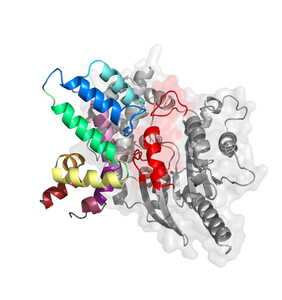 The Garcia-Marcos laboratory has recently published a new study in the journal Science Signaling. In this study, the authors characterized how cancer-associated mutations in a family of negative regulators of G proteins affect the ability of these regulators to modulate G protein activity. Many of these mutations turn out to be deleterious for the G protein regulatory function. In the words of the journal’s Editor:
The Garcia-Marcos laboratory has recently published a new study in the journal Science Signaling. In this study, the authors characterized how cancer-associated mutations in a family of negative regulators of G proteins affect the ability of these regulators to modulate G protein activity. Many of these mutations turn out to be deleterious for the G protein regulatory function. In the words of the journal’s Editor:
“Mutations in the genes encoding the α subunits of heterotrimeric G proteins are associated with cancer. In particular, mutations that prevent the Gα subunits from hydrolyzing GTP, thus rendering them constitutively active, are pro-oncogenic. DiGiacomo et al. surveyed cancer-associated mutations in regulator of G protein signaling (RGS) proteins, which are physiological inhibitors of G proteins. Through bioinformatics analysis, genetic interaction studies in yeast, and functional assays in mammalian cells, the authors showed that many cancer-associated RGS mutants fail to inhibit G protein signaling because of reduced protein stability or impaired interactions with their targets. With these tools, further cancer-associated mutations in RGS proteins can be characterized.”
This work was spearheaded by the former Garcia-Marcos’ laboratory postdoc Vincent DiGiacomo, who is currently working in the Cambridge biotech company DeepBiome, with the help of other laboratory members, including two undergraduate students from Boston University. The entire study was carried out in the Department of Biochemistry.